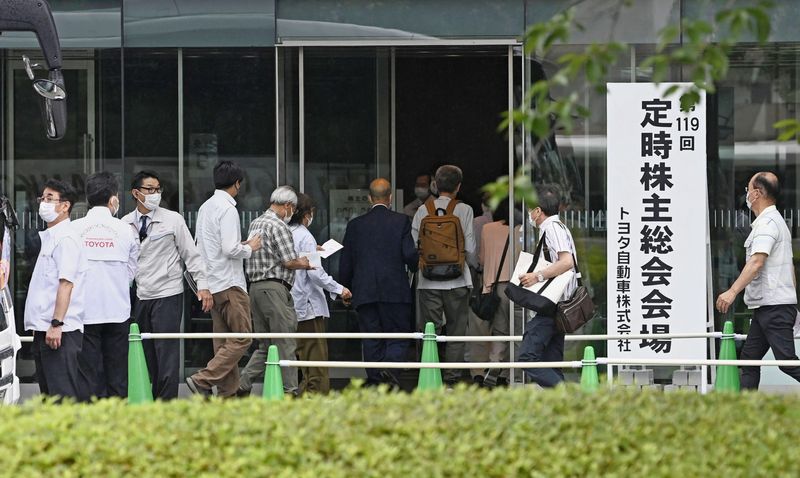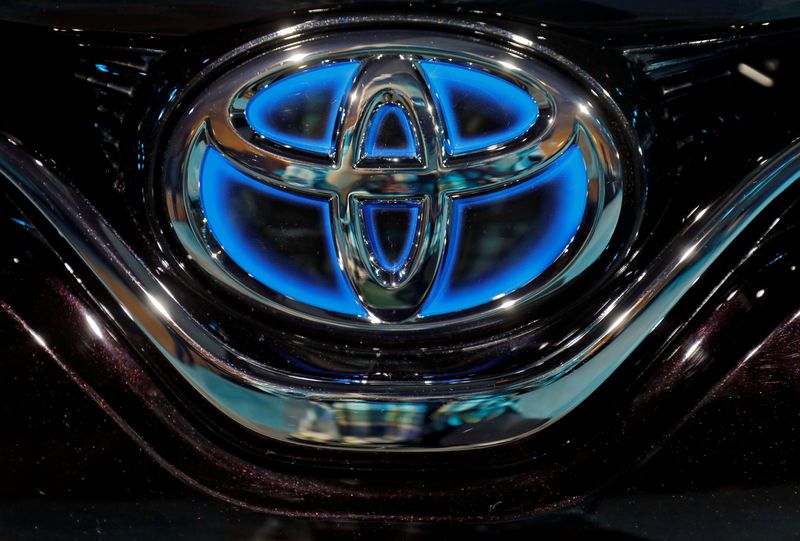By Daniel Leussink
TOYOTA CITY, Japan (Reuters) - Toyota shareholders rejected a resolution urging greater disclosure of its climate lobbying on Wednesday, voting down the first investor proposal to come before the automaker's annual general meeting in almost two decades.
Investors also backed all 10 members of the board, including Chairman Akio Toyoda, despite concerns about board independence raised by prominent U.S. proxy advisers. The breakdowns of both votes won't be released until Thursday.
The climate resolution was submitted by Danish pension fund AkademikerPension and two other European asset managers and sought to make Toyota release more details about its lobbying activities related to climate change.
It was widely expected to fail after Toyota's board recommended shareholders vote against it. The automaker's management typically enjoys strong support from shareholders, which include some of its group companies and suppliers.
Still, the proposal sharpened focus on Toyota's electric vehicle (EV) strategy and governance ahead of the meeting, the first under new CEO Koji Sato. Green investors and activists have said Toyota has been too slow to capitalise on the surging popularity of battery electrics.
Some influential U.S. funds, including top public pension CalPERS, had come out in favour of the climate resolution and against the re-election of board members including Toyoda.
Toyoda, the grandson of the company's founder, was re-elected with 96% support last year.
The shareholder meeting came just a day after the world's top-selling automaker unveiled an ambitious roadmap for electric vehicles (EV) involving solid-state batteries and radical production changes, the strongest signal yet of an intention to capture a big slice of EV market share.
"I believe that Toyota today can manage its business with a sense of speed," Sato told shareholders.
Toyota shares rose 6.3% on Wednesday after adding to another sharp rise a day earlier and logging their best two-day performance in a little over three years.
DIFFERENT APPROACH
Toyota says EVs are just one element in its multi-pathway approach to carbon neutrality that includes petrol-electric hybrids and hydrogen fuel cells.
It says its approach is more effective to reduce carbon emissions and more practical because consumer needs, EV infrastructure and clean energy supply differ by country.
It says its board meets governance standards set by the Tokyo Stock Exchange and has said Toyoda had been re-nominated because he would push the transformation to a company that provides a range of mobility services.
"Japanese people like Toyota and I think they support Akio," said 61-year-old Tadashi Imai, an individual shareholder who said he has held stock in the company for around a decade.
He said the previous day's share price rise on news of the roadmap was "really impressive".
Proxy adviser Glass Lewis recommended shareholders vote against Toyoda, citing what it said was his responsibility for a lack of sufficient board independence.
Japanese companies face more pressure from investors, especially on environmental, social and governance (ESG) issues. Shareholders have made a record number of proposals at annual meetings this year.
One shareholder, 67-year-old Hiroshi Ii said he has owned Toyota shares for 14 years and travelled to the meeting in Toyota City central Japan from Tokyo.
He voted against the climate resolution and for the board he said, saying he hoped Toyoda could help new chief executive Sato.

"For the stability of management it would be good if Chairman Toyoda can support him in the background."
Toyota has also said it was developing an EV platform to reduce costs including an assembly line that would do away with the conveyor belt system that has defined auto production for over 100 years.
